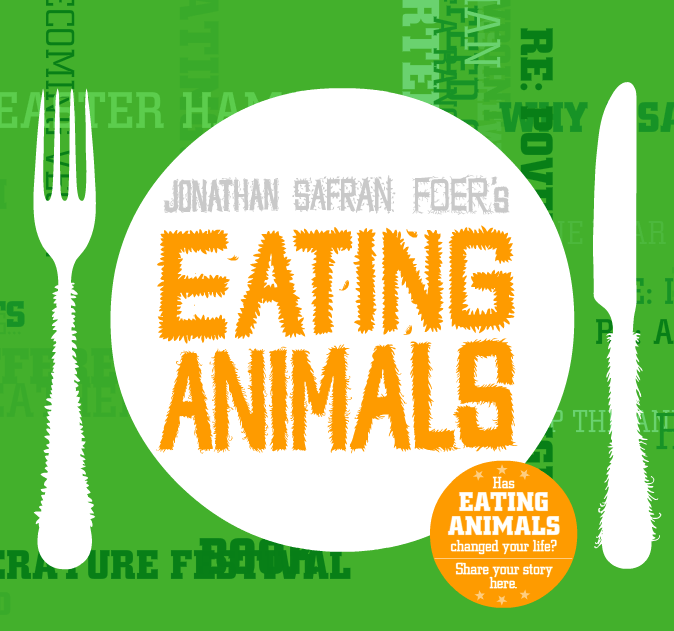In the vast tapestry of literature that grapples with the ethical and emotional implications of our dietary choices, “Eating Animals” by Jonathan Safran Foer emerges as a riveting narrative that intertwines personal anecdotes with a critical examination of the practices surrounding animal consumption. Throughout this compelling work, Foer employs a delectable array of metaphors that elevate the discourse around vegetarianism, omnivorism, and the often invisible choices that dictate our culinary landscapes.
At its core, “Eating Animals” is not merely a plea for vegetarianism; it is a profound exploration of the interconnectedness between humanity and the natural world. Foer begins by likening our relationship with animals to a dance—an intricate choreography where we, as humans, often lead without regard for the well-being of our partners. This metaphor sets the stage for a deeper inquiry into the ethics of eating, as it compels readers to consider whether this dance is one of harmony or coercion. Are we twirling gracefully alongside our fellow creatures, or are we imposing our will in a way that disrupts the delicate balance of existence?
The book is structured around Foer’s own journey from omnivore to vegetarian, punctuated by reflections on family traditions and the societal pressures that condition our eating habits. Each chapter serves as a vignette—an unfolding story that reveals not only Foer’s internal struggles but also the broader implications of livestock production. For instance, Foer’s depiction of factory farming reads like a dystopian narrative, exposing the grotesque realities that lurk behind our neatly packaged meals. These narratives serve as stark reminders that every bite we take is enmeshed in the ever-complicated web of ecological and ethical choices.
What makes “Eating Animals” particularly engaging is Foer’s adeptness at weaving personal experiences into the discursive fabric of animal rights. When he recounts the birth of his son, the text becomes an evocative symbol of rebirth and forethought. The juxtaposition of nurturing a new life while wrestling with the choices surrounding food consumption presents an emotional dichotomy that resonates powerfully. Foer invites readers to ponder: how does one reconcile the joy of parenting with the harsh realities of animal husbandry? In doing so, he transforms abstract ethical dilemmas into visceral experiences, making the arguments not only logical but deeply personal.
Foer’s discourse is not solely about the grievous impacts of meat consumption. He artfully examines the myriad cultural practices surrounding food, thus enriching his analysis with a global perspective. The nuances of diverse culinary traditions are explored, spotlighting how geography, tradition, and innovation interplay in the decisions we make about what goes on our plates. This exploration invites readers to appreciate food not just as sustenance but as an artifact rich with history and cultural significance, reinforcing that our choices are often a reflection of values inherited from previous generations.
Moreover, Foer utilizes vivid imagery and poignant anecdotes to present readers with the moral complexities entwined in animal agriculture. One particularly striking metaphor alludes to the illusion of choice. He describes the supermarket aisles as a “theater of abundance,” where brightly-lit displays mask the darker realities of food production. This metaphor serves to critique the disconnection many experience from their food sources—an estrangement that allows consumers to maintain a facade of innocence while oblivious to the ethical repercussions of their consumption. Through such evocative language, Foer illuminates the cognitive dissonance that underpins modern eating habits, rendering the abstract implications of animal consumption painfully tangible.
The book is as much about philosophical contemplation as it is a call to action. Foer delves into the ethical arguments presented by advocates of animal rights, inviting readers to confront the moral imperatives that accompany their culinary choices. He challenges readers to reflect on the nature of suffering, autonomy, and the capacity for kindness. The questions he raises linger long after the last page is turned: What responsibility do we bear for the sentient beings that are raised and slaughtered for our nourishment? What does it mean to live in a world where creatures are commodified units of production rather than beings worthy of compassion?
A unique aspect of “Eating Animals” is its practical approach in addition to philosophical musings. Foer acknowledges the complexity of transitioning towards a more compassionate diet, providing readers with a nuanced understanding of sustainable choices without resorting to dogma. This balanced perspective encourages a gradual shift in perspective, fostering an appreciation for mindful living and conscious consumption. The emphasis on incremental change, rather than all-or-nothing thinking, is not only realistic but empowering, urging readers to find their own paths toward ethical eating.
In conclusion, “Eating Animals” is a tour de force that masterfully interweaves personal reflection, philosophical inquiry, and cultural analysis in a dialogue about food ethics. Through his engaging metaphors and emotive narratives, Jonathan Safran Foer compels us to reconsider our relationship with the animals we eat, urging a reevaluation of the choices we make each day. This book does not just present a viewpoint; it challenges us to engage in a conscious unearthing of our values and ultimately to reimagine the future of our plates. In a world inundated with apathy and convenience, Foer’s message is a clarion call, awakening the ethical eater within us all.
